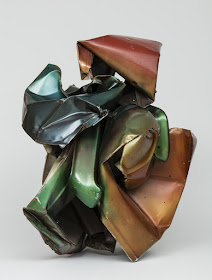"John Chamberlain, one of the most influential three-dimensional Abstract Expressionists of the twentieth century, constantly challenged, disrupted, and propelled forward the fields of art and design. Born John Angus Chamberlain on April 16, 1927, in Rochester, Indiana, he served in the United States Navy as seaman first class during World War II. After the war, he enrolled at the Art Institute of Chicago on the GI Bill. Later he studied poetry and sculpture at the renowned Black Mountain College, where he developed his ideas around visual language. Reflecting on what he took away from his Black Mountain experience, he once stated: “If I have a room full of parts, they are like a lot of words and I have to take one piece and put it next to another and find out if it really fits. The poet’s influence is there, plus in my titles.” Elements of this would resurface again and again in works he produced throughout his career. Many critics and scholars have focused on Chamberlain’s place in art history as an Abstract Expressionist, Surrealist, or Pop artist, but ultimately his diverse output defies categorization. Above all he strove to make art that would, in his words, “make the viewer’s heart beat.”...Over the last three decades of Chamberlain’s career, the artist pursued ever more diverse variations of his signature “fit” that featured aggressive conjunctions of shape and color. The sculptures have deep folds that many perceive as resembling the folds of Renaissance sculpture, signaling the presence of a figure or void. Toward the end of his life, he was making some of the largest works of his entire career—assemblages of horizontal and vertical crushed metal from 1940s and 1950s automobiles, pursuing his perennial artistic ethos.(.johnchamberlain.co)
















No comments:
Post a Comment